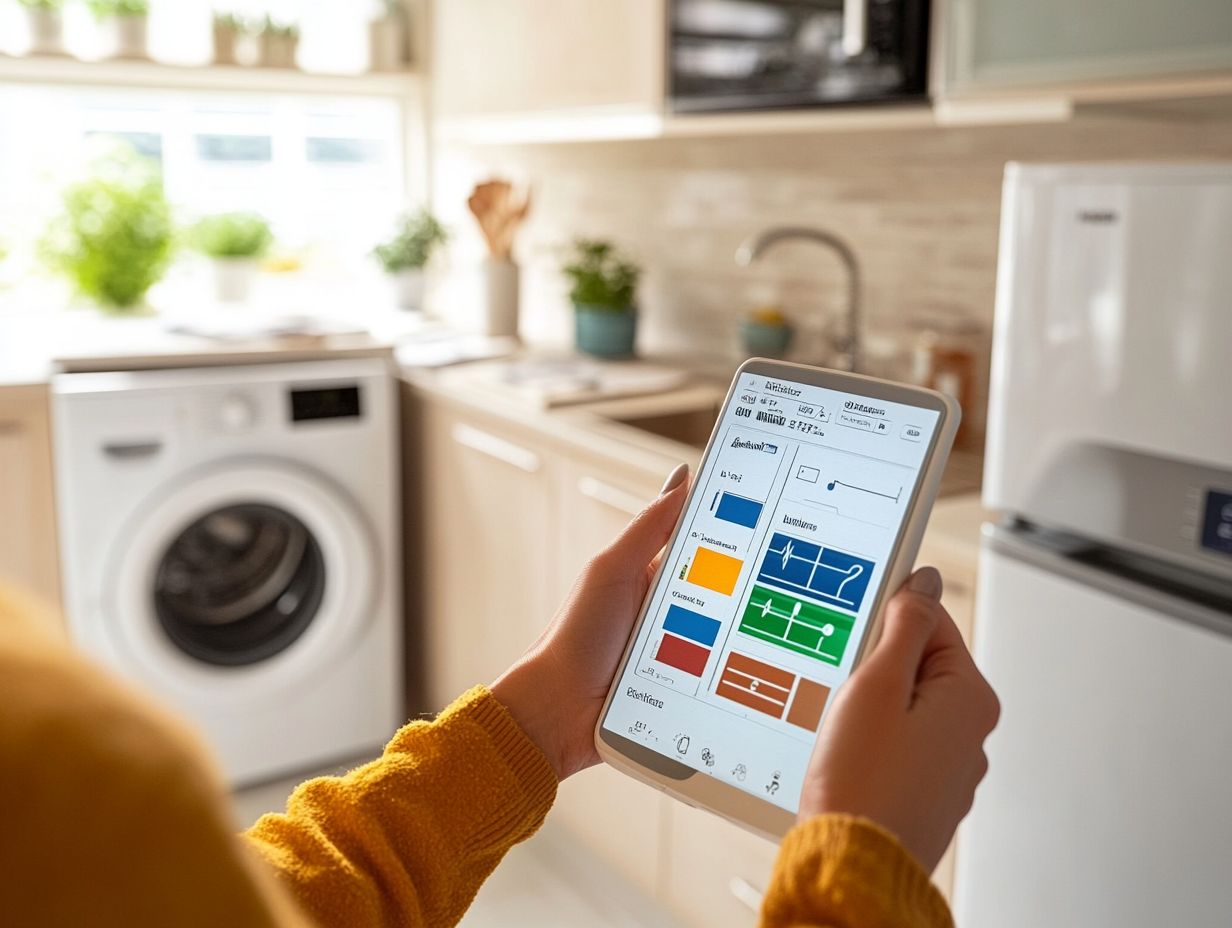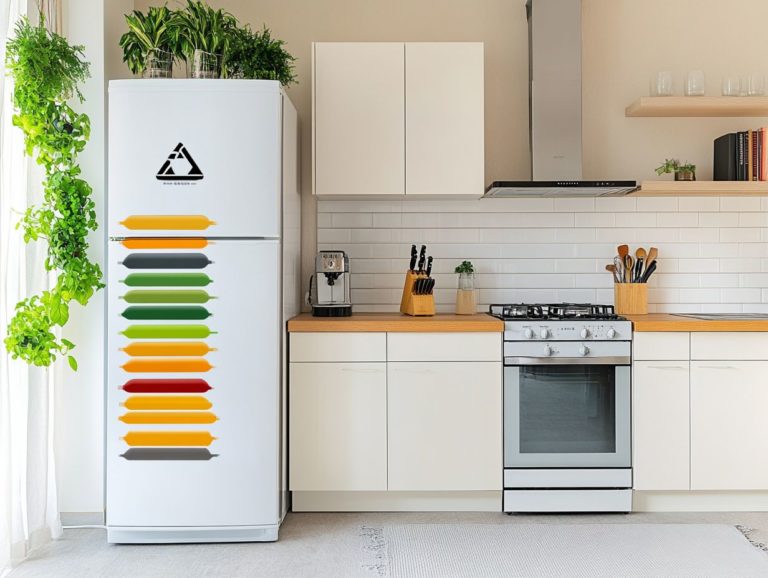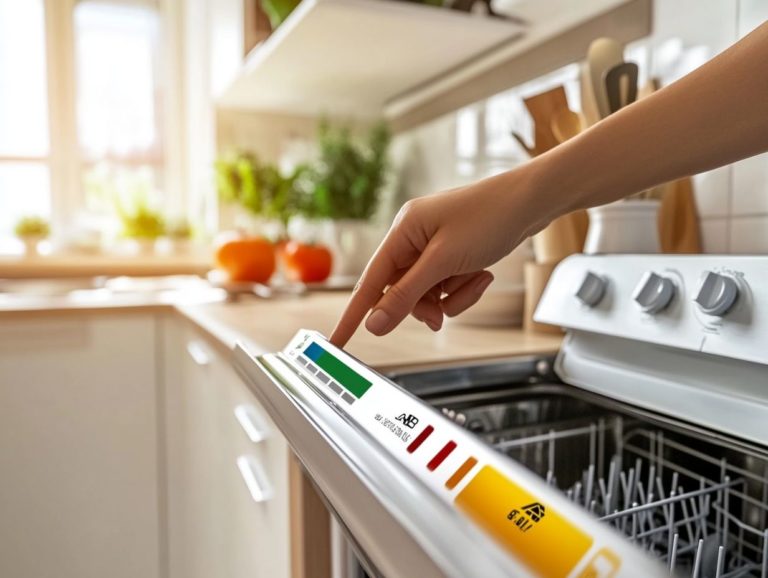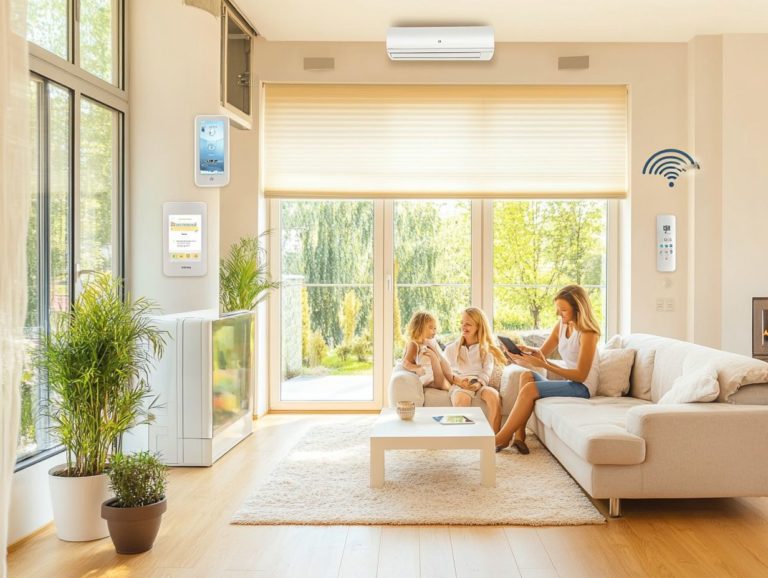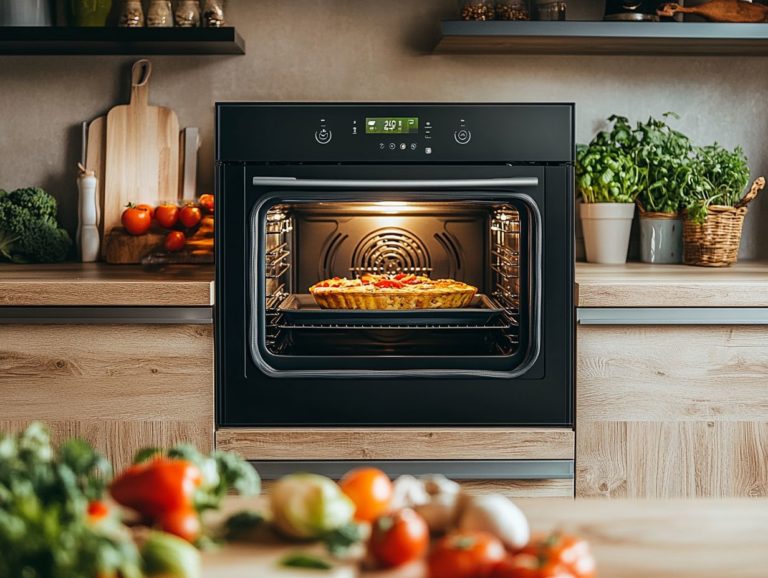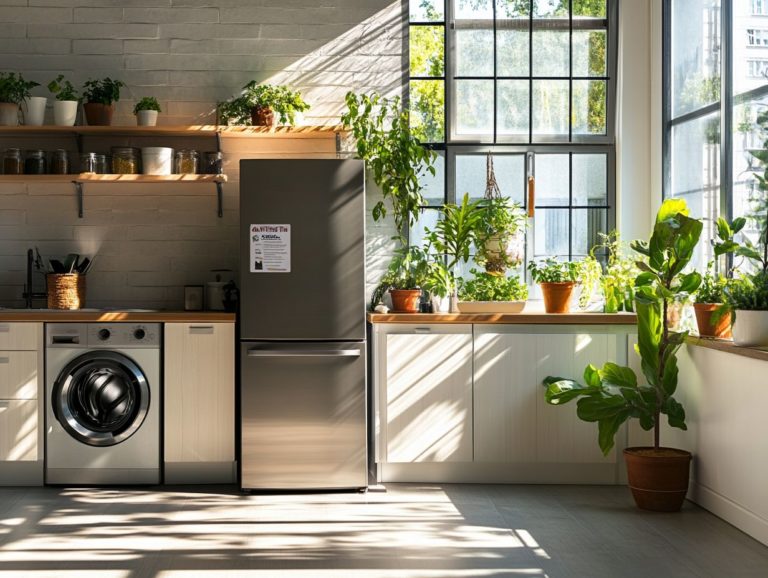Understanding Appliance Energy Consumption
Understanding appliance energy consumption is essential for anyone aiming to manage energy bills and minimize their environmental footprint.
This article explores the factors influencing energy usage, such as appliance types, efficiency ratings, and environmental conditions.
You will find practical methods for measuring and monitoring energy consumption, along with valuable tips for adopting energy-saving habits and selecting energy-efficient appliances.
Discover how your appliance choices can make a real difference for the planet!
Contents
- Key Takeaways:
- Factors Affecting Energy Consumption
- Calculating and Monitoring Energy Consumption
- Ways to Reduce Appliance Energy Consumption
- Impact of Appliance Energy Consumption on the Environment
- Frequently Asked Questions
- What is appliance energy consumption?
- What are some examples of appliances with high energy consumption?
- Why is understanding appliance energy consumption important?
- How can I reduce appliance energy consumption?
- What is the difference between energy-efficient and energy-saving appliances?
- Can I track my appliance energy consumption?
Key Takeaways:
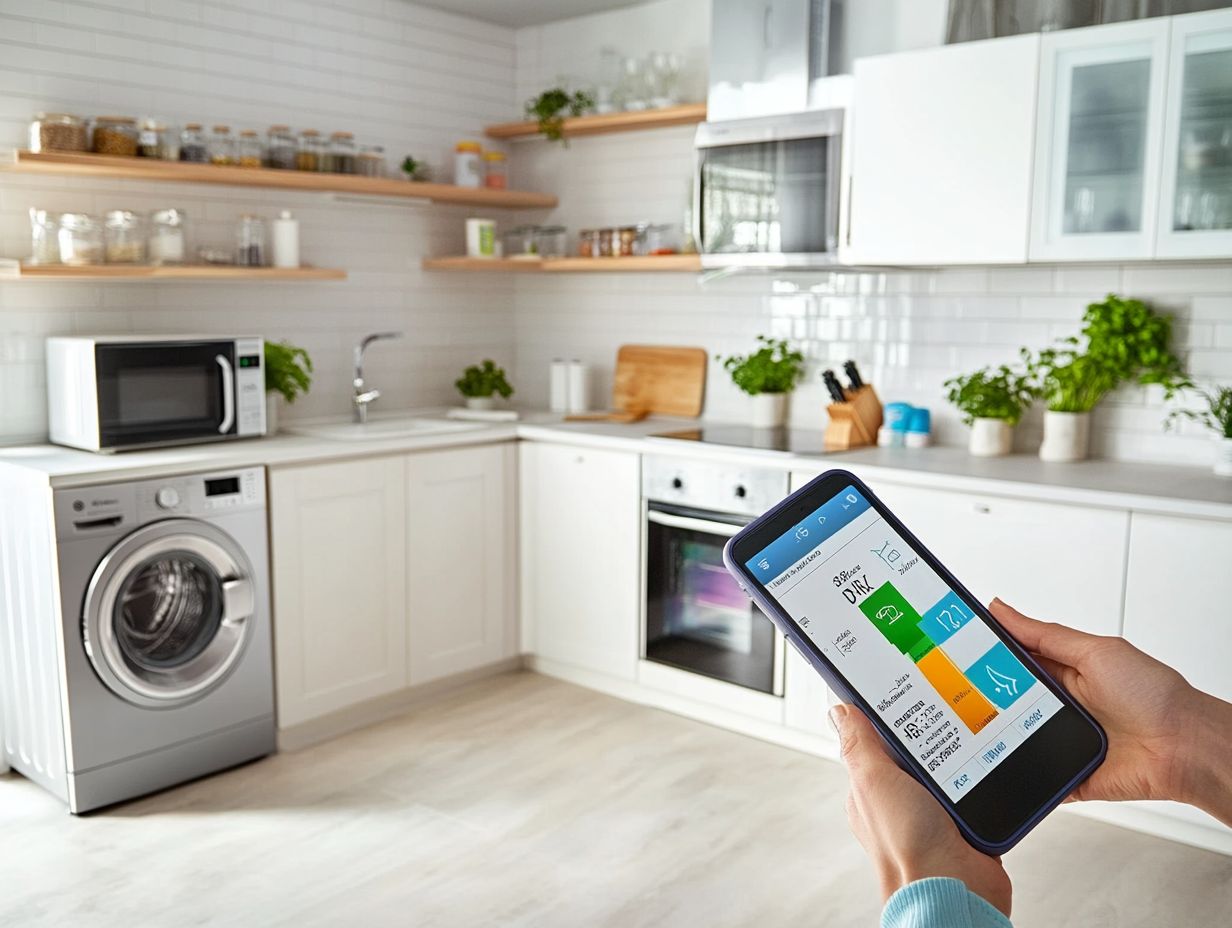
- Understanding energy consumption can save you money.
- Appliance type and conditions impact energy use.
- Monitor your usage for a positive environmental effect.
What is Appliance Energy Consumption?
Appliance energy consumption refers to the electricity your household appliances use over time, significantly shaping your monthly electric bills.
This consumption can vary based on the appliance type, wattage, and usage frequency, leading to different energy costs.
Understanding energy consumption is crucial for homeowners who want to use electricity wisely, lower electric bills, and support long-term energy conservation.
For instance, a refrigerator might average around 150-300 kWh per month, while an older model could consume much more.
This underscores the importance of choosing energy-efficient appliances.
By monitoring your energy usage, you can pinpoint which appliances drain your resources and make informed choices about their usage or potential upgrades.
Simple energy-saving strategies, such as unplugging devices when not in use or switching to energy-efficient settings, can lead to noticeable reductions in your overall energy expenditures.
Being proactive about appliance energy consumption helps you lower electric bills and supports a more sustainable lifestyle.
Factors Affecting Energy Consumption
Several factors significantly impact your household appliances’ energy consumption, making it essential to understand how these elements interact.
Key considerations include appliance wattage, energy efficiency ratings, and your usage patterns.
These aspects define the total electrical consumption in your home.
External factors also affect energy consumption, including environmental conditions and seasonal demands.
This highlights the importance of making informed choices regarding how you operate and select your appliances.
Types of Appliances and Their Energy Usage
Different types of household appliances exhibit distinct energy usage patterns that influence your electricity costs and conservation efforts.
Larger devices like washing machines and refrigerators generally consume more energy compared to smaller appliances like electric kettles or light bulbs.
In the kitchen, ovens and dishwashers often have higher energy consumption rates than basic devices like toasters or microwaves.
Regarding entertainment devices, energy consumption can vary widely based on type and size. For example, a 55-inch LED TV typically consumes less power than older CRT models.
Cleaning tools, particularly vacuum cleaners, also show a range of efficiency; more powerful models often draw more power.
By understanding these distinctions, you can select appliances that fit your lifestyle and help you maintain a mindful approach to your energy footprint.
Environmental Factors
Environmental factors significantly influence the energy consumption patterns of household appliances, affecting both their efficiency and overall effectiveness.
Elements like temperature, humidity, and your home’s design can alter how these appliances operate. This can lead to fluctuations in electricity usage. For example, an air conditioner may use more energy during scorching weather. Additionally, devices left plugged in can contribute to unnecessary consumption, underscoring the need for mindful appliance use.
Standby power can waste a lot of energy and money. Many appliances continue to draw electricity even when seemingly idle, collectively leading to substantial energy waste over time. This phenomenon doesn t just inflate your monthly energy bills; it also has broader environmental repercussions.
Act now! Use smart power strips or unplug devices to save energy today. By increasing your awareness of this issue and adopting energy-efficient practices, you can make informed choices that contribute to a significant reduction in unnecessary energy consumption.
Calculating and Monitoring Energy Consumption
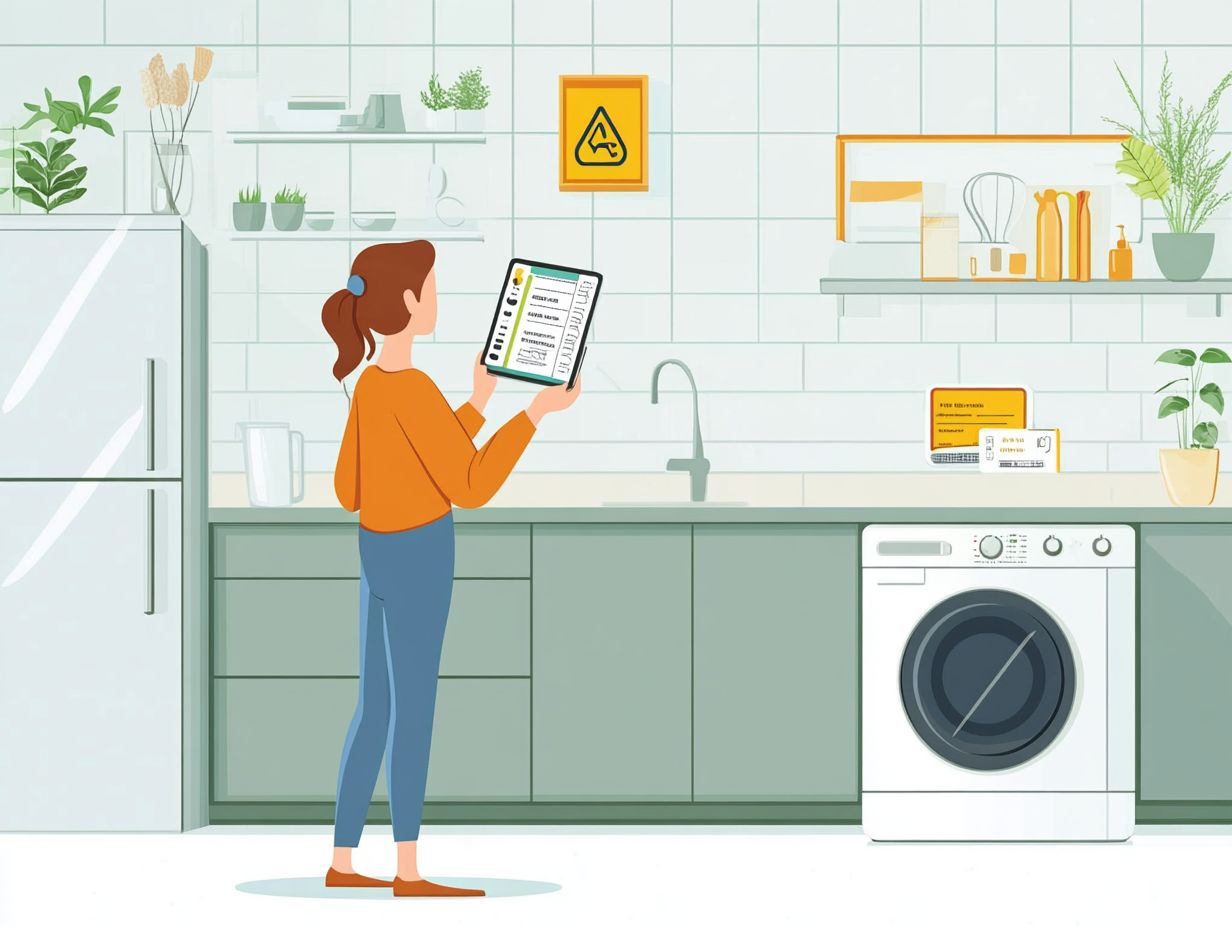
Calculating and monitoring energy consumption is essential for anyone seeking to manage their electric bill effectively while uncovering opportunities for energy savings.
By grasping the costs associated with running different appliances taking into account their power use and average usage you can make informed choices to optimize your electrical consumption.
Embracing tools and technologies, such as smart home devices and energy monitors, offers you real-time insights into your energy usage patterns, enabling you to adjust your habits for greater efficiency!
Methods for Measuring Energy Usage
Measuring energy usage is crucial for understanding how much electricity different appliances consume over time. This can significantly impact your household energy costs.
There are various methods at your disposal, such as energy meters and smart plugs, that track the power use of your appliances in real-time. By identifying patterns in your energy consumption, you can pinpoint high-energy devices and make informed decisions about their usage. This can enhance your energy conservation efforts.
These devices serve a dual purpose: they not only provide visibility into your current energy use but also collect historical data for long-term analysis.
For instance, your average refrigerator might draw around 150-200 watts, while a microwave can spike up to 1000 watts during operation.
Smart energy monitors, like the Sense Energy Monitor, can reveal which of your devices are consuming the most power, alerting you to opportunities for efficiency improvements.
By leveraging these technologies, you can adjust your habits such as running energy-intensive appliances during off-peak hours ultimately leading to reduced energy bills and a smaller carbon footprint!
Tracking and Analyzing Energy Consumption
Tracking and analyzing your energy consumption enables you to identify usage patterns. This allows for smarter management of your appliances and the potential to reduce energy costs.
By keeping a detailed list of your appliances and regularly reviewing consumption data, you can pinpoint which devices are driving up your electric bill. This proactive approach to energy management enables you to make informed decisions about appliance selection and operation, fostering energy conservation in your daily life.
Over time, these considerations can lead to significant savings while contributing to a more sustainable lifestyle.
To support your efforts, consider utilizing energy monitoring tools and platforms, such as smart meters or apps like EnergyHub and Sense. They offer valuable insights into your real-time usage. These solutions often come with data visualization features, making it much easier for you to interpret trends and spot anomalies in your energy consumption.
By leveraging these technologies, you can track your consumption more effectively and set goals for reducing it. This ultimately promotes both environmental responsibility and financial savings!
Ways to Reduce Appliance Energy Consumption
You can easily reduce your appliance energy consumption. This action can significantly lower your electricity bills and household expenses.
Simple changes, like switching to LED light bulbs, can make a noticeable difference. Investing in high-efficiency appliances enhances your savings.
Not only will you minimize your electricity bills, but you’ll also help create a sustainable future.
Energy-Efficient Appliances
Energy-efficient appliances use less electricity while delivering the same performance. They are a great choice for those who care about the environment.
These appliances often feature innovative designs that reduce energy use without sacrificing functionality. By choosing energy-efficient options, you’ll enjoy significant savings and help reduce your environmental impact.
Look for ENERGY STAR-rated refrigerators, washing machines, and dishwashers. Models with higher energy ratings typically consume less power.
Examine wattage and efficiency ratings to make informed choices. You’ll not only lower your utility bills but also promote a sustainable lifestyle.
Energy-Saving Habits
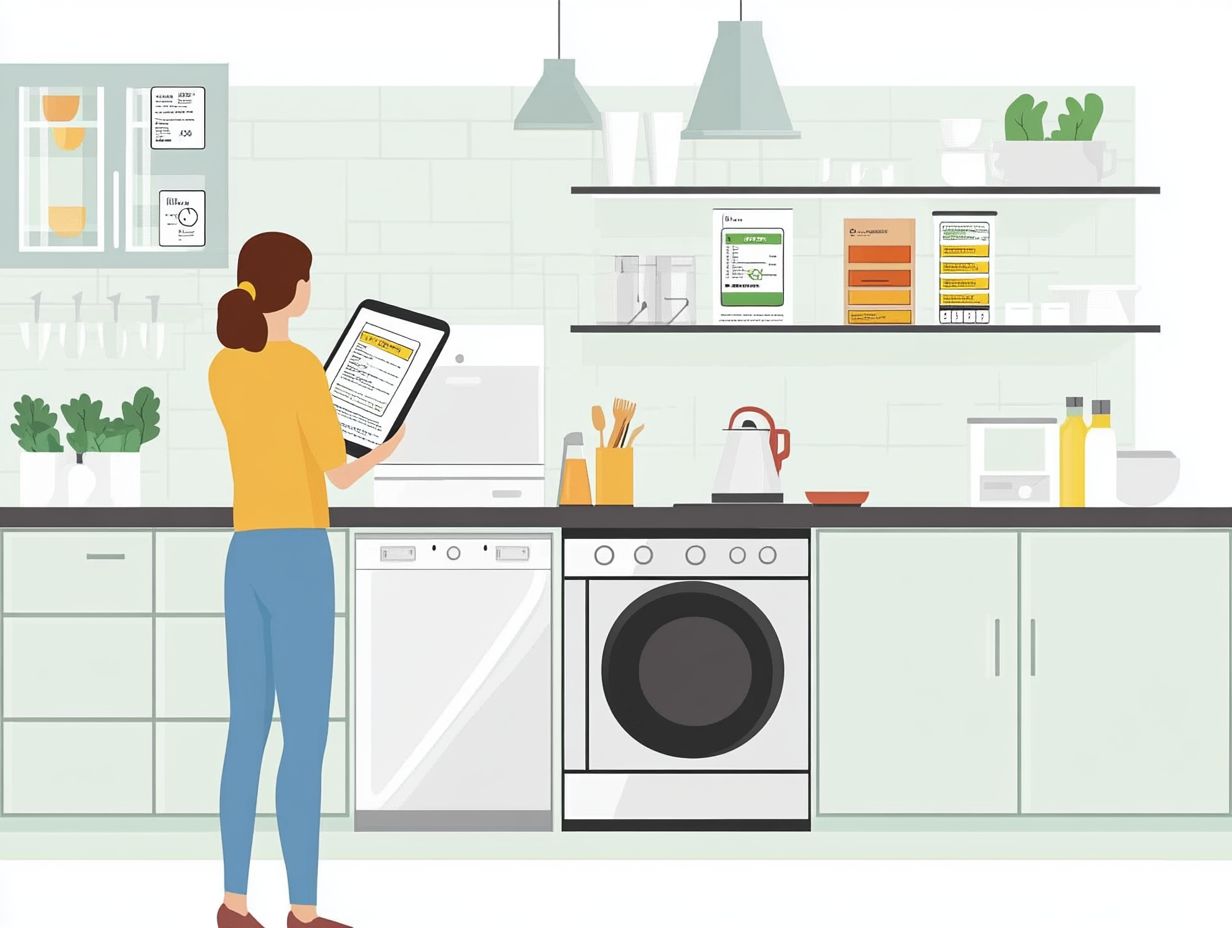
Adopting energy-saving habits can transform your energy consumption. This leads to lower electric bills and helps the environment.
Simple actions, like unplugging devices when they re not in use, can lead to noticeable savings. Use appliances during off-peak hours to save money.
Incorporating energy-efficient devices boosts these savings. For example, LED light bulbs use less energy and last longer than traditional bulbs.
Smart power strips reduce phantom load, which is the energy used by devices when they re off but still plugged in. Regularly check and upgrade your insulation to prevent energy loss.
These practical measures are easy to adopt in your daily routine. They also foster a mindset that promotes long-term conservation and environmental health.
Impact of Appliance Energy Consumption on the Environment
Appliance energy consumption greatly impacts the environment. Higher electricity usage leads to more greenhouse gas emissions and a larger ecological footprint.
By understanding how your appliances affect energy use, you can make choices that support efficiency and sustainability. Small changes in your habits can make a big difference for the environment.
Be responsible with your appliance use to enjoy significant benefits for our planet!
Environmental Consequences
The environmental consequences of high appliance energy consumption are extensive. They cause problems like climate change and resource depletion.
Since electricity is often generated from fossil fuels, excessive energy usage leads directly to increased carbon emissions. This contributes to a growing ecological footprint.
By prioritizing energy conservation and embracing sustainable practices, you can make a big difference today! Every choice you make at home whether it s the type of light bulbs you use or the efficiency of your appliances plays a crucial role.
For instance, opting for Energy Star-rated appliances can significantly cut down on energy consumption while also trimming your utility bills.
Simple adjustments can make a big difference. Unplug devices when they’re not in use. Using smart power strips can also help reduce energy waste.
By making informed decisions, you can reduce your carbon footprint and inspire a ripple effect in your community. This fosters a collective movement towards sustainability.
Embracing energy-efficient technologies promotes environmental stewardship and paves the way for a more resilient ecosystem.
Frequently Asked Questions
What is appliance energy consumption?
Appliance energy consumption refers to the amount of energy an appliance uses to perform its functions. It is measured in kilowatt-hours (kWh) and can vary depending on the type, size, and usage of the appliance.
What are some examples of appliances with high energy consumption?
Appliances like refrigerators, air conditioners, and washing machines typically have high energy consumption due to their constant use and size. Space heaters and dishwashers can also consume a lot of energy if used frequently.
Why is understanding appliance energy consumption important?
Knowing about appliance energy consumption can save you money and help you make smarter choices. It enables you to monitor and manage your energy usage, and it can guide you when purchasing new appliances.
How can I reduce appliance energy consumption?
There are several ways to reduce appliance energy consumption. Start by choosing energy-efficient appliances. Unplug appliances when not in use, use power strips, and practice energy-saving habits like air-drying clothes.
What is the difference between energy-efficient and energy-saving appliances?
Energy-efficient appliances are designed to use less energy while performing the same functions as traditional appliances. Energy-saving appliances incorporate features like timers and sensors to help reduce energy usage.
Can I track my appliance energy consumption?
Yes, you can track your appliance energy consumption through your electricity bill, using a watt meter, or with an energy monitoring device. Some smart appliances even have built-in energy tracking features.
Join the movement for a greener planet. Start choosing energy-efficient appliances today!

